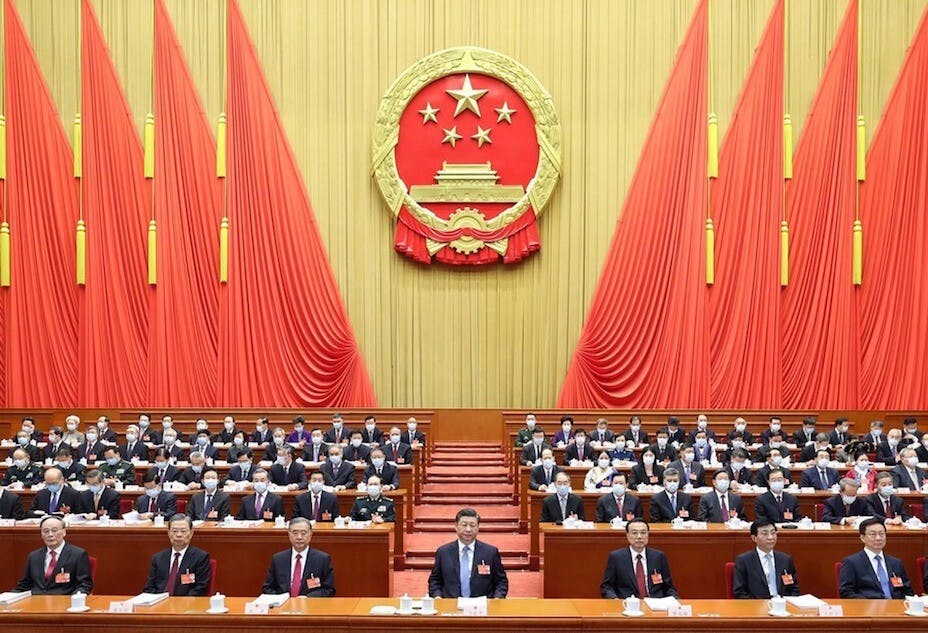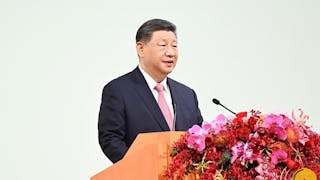國務院總理李克強3月5日發表的2022年《政府工作報告》,不僅內容全面,而且展示了內地強而有力和有效的管治,對港澳具有直接的影響。
《政府工作報告》報告首先回顧了2021年。李克強表示,2021年是「以習近平同志為核心」的中國共產黨慶祝建黨100周年、打贏脫貧攻堅戰、全面建成小康社會,開始全面建成社會主義現代化國家的一年。2021年,中國經濟持續發展,科技創新能力進一步加強,經濟結構和區域布局繼續優化,改革開放不斷深化,生態文明建設持續推進,人民生活水平穩步提高,疫情防控成果持續鞏固。
穩健貨幣政策 化解金融風險
李克強接着談到,中國如何有需要通過穩健的貨幣政策,幫助地方政府防範和化解重大金融風險、優化地方政府專項債券發行使用,以及做好高校畢業生等重點群體就業工作。 從結構上看,確保經濟穩定和就業是經濟成功的關鍵。
他強調,政府需要減輕製造業中小微企的稅費負擔,包括對煤炭、電力和能源供應企業實施緩繳稅費,加強鐵路、公路、航空、海運和港口等運輸保障。大型商業銀行普惠小微企業貸款增幅超過40%。
通過深化改革、擴大開放,持續改善營商環境,減少涉企業的審批手續和辦理時限,加強和創新監管,反壟斷和防止資本無序擴張,維護公平競爭。
加強鐵路、公路、航空、海運、港口等運輸保障,同時加強國家實驗室建設,推進重大科技項目實施,強化知識產權保護,加快傳統產業數字化智能化改造。
推動城鎮建設 振興廣大鄉村
在區域協調發展方面,中央推動縣城為重要載體的城鎮化建設。加強農業生產,保障農資供應,對種糧農民提供一次過補貼。同時,推動鄉村振興,鄉鎮企業同樣受到國家補貼的幫扶。
持鑟推進生態保護修復重大工程,強調可持續發展,全面實施長江10年禁漁、發展可再生能源產生、啟動全國碳排放權交易市場。
實施三孩政策 嚴格監管藥品
在保障民生方面,《政府工作報告》強調,要加大農村義務教育薄弱環節建設力度,惠及3700多萬學生,加大對貧困學生的補貼力度,上調退休人員基本養老金,擴大社會保障範圍,覆蓋殘疾家庭,實施三孩生育政策,加快發展保障性租賃住房,嚴格藥品疫苗監管。
推進法治政府建設和治理創新方面,李克強指出,政府要積極回應人大代表和政協委員的提案,發揮審計監督作用,創新城鄉基層治理,紥實做好信訪工作,化解信訪積案。強化安全生產和應急管理,打擊電訊網絡詐騙等犯罪活動。
發展全球夥伴 致力大國外交
在外交政策方面,李克強總理表示,中國繼續推進中國式大國外交,特別是習近平主席通過視像方式,出席了聯合國大會、二十國集團領導人峰會、亞太經合組織領導人非正式會議、金磚國家領導人會晤、中國─東盟建立對話關係30周年紀念峰會、中非合作論壇部長級會議開幕式、東亞合作領導人系列會議、亞歐首腦會議等活動。
李克強強調,中國要推動構建「人類命運共同體」,積極發展全球夥伴關係,積極參與全球治理體系改革和建設,推動國際抗疫合作,共同應對全球性問題和挑戰。
李克強也清醒地指出了中國面臨的幾個挑戰,包括世界經濟復甦動力不足、大宗商品價格高位波動、局部疫情時有發生、能源原材料供應偏緊、地方政府工作存在不足,形式主義和官僚主義仍然突出,脫離實際、違背群眾意願的現象屢有發生。他批評少數幹部不擔當、不作為、亂作為,嚴重侵害群眾的權益。
保守增長目標 維持政策穩健
接着,李克強談到今年中國發展的主要預期目標:國民經濟增長5.5%左右,失業率全年控制在5.5%以下,居民消費價格漲幅3%左右,糧食產量保持在1.3萬億斤以上。
簡單來說,本屆政府旨在實現三個目標:保持宏觀政策連續性,增強有效性;繼續做好常態化疫情防控,以及始終堅持穩字當頭,穩中求進,關鍵是保持經濟控制、社會穩定和政治合法性。
政府的角色,是加大對基礎建設項目的投入,同時要求各級地方政府要勤儉節約,不鋪張浪費,不搞形象工程,肆意揮霍公款要嚴肅查處,要把資金用在發展緊要處、民生急需上。
嚴控撤縣建市 遏制企業壟斷
除了改革政府職能,維護市場化法治環境,促進企業投資環境,加強數字化、智慧化治理,加強政府內部監督,遏制企業壟斷行為之外,要通過網絡平台培育內部消費需求,同時加大社區養老托幼等配套設施建設力度。必須提高鄉鎮服務質量,嚴控撤縣建市設區。顯然,地方一級的「王國」是被禁止的。
農業生產必須穩定,包括促進小麥、豆類和油料生產,保障化肥等價格穩定,加強中低產田改造,啟動第三次全國土壤調查,加強農業科技攻關和推廣應用,以及加強生豬產生調控,抓好禽畜、水產等生產供應。所有這些措施,都是為了確保穩定的糧食供應。
關注就業保障 支持振興中醫
《政府工作報告》中有相當一部分篇幅,重點關注穩就業的細節,包括向不裁員少裁員的企業,繼續實施失業保險穩崗返還政策,加強對1000萬高中畢業生就業創業政策支持和不斷線服務,做好退役軍人安置和就業保障,防止和糾正性別、年齡等就業歧視,開展大規模職業技能培訓,安排1000億元失業保險基金支持穩崗和培訓。
《報告》又提出,提高居民醫保和公共衛生服務經費財政補助,強化藥品疫苗質量安全監管,提高重大疫情監測預警,深化公立醫院改革,支持中醫藥振興發展,加快建設國家級、省級和省級區域醫療中心,提升基層防病治病能力。
貫徹一國兩制 促進國家統一
《報告》還提到,要全面貫徹「一國兩制」、「港人治港」、「澳人治澳」和高度自治的方針,堅定落實中央對特區的「全面管治權」和「愛國者治港」、「愛國者治澳」的原則。中央也支持港澳發展經濟、改善民生,更好地融入國家發展大局。
在台灣問題上,中央堅持一個中國原則和「九二共識」,促進兩岸關係和平發展和國家統一,堅決反對台獨,反對外部勢力干涉,使兩岸「共創民族復興的光榮偉業」。
李克強的《政府工作報告》充分表明,中共以黨治國的體制,在國家發展策略上仍然非常強大、有效、堅定和具戰略性。中國政府在共產黨領導下,具備前瞻性和綜合性的運作,旨在困難和不確定的全球環境中穩定經濟,防控疫情蔓延,以適當的監督和審計工作管理各級政府,在地方政府層面遏制浪費,促進經濟對內對外「雙循環」,通過大國外交樹立和平中國的形象。
港澳必須學習 強力有效管治
香港和澳門都必須學習中央政府在戰略上處理其經濟、社會和政治的綜合方法。正值Omicron變種在香港迅速蔓延之際,香港特區政府必須學習內地強力而有效的管治。澳門在新冠病毒及其變種病毒的防控上優於香港。
對北京來說,治理的明顯特徵,是具有很強的預見和解決問題、應對潛在危機、採取主動解決方案搶佔先機的能力,以及與公眾進行有效溝通的能力,這在《政府工作報告》中論述非常突出。最後,中央政府仍然堅定地致力讓「一國兩制」在港澳取得成功,而台灣明顯是未來幾年的下一個目標。
The 2022 Government Report: Strong Governance in China
The 2022 Government Report delivered by the Chinese Premier Li Keqiang is not only comprehensive in its scope but also demonstrating strong and effective governance in mainland China with immediate implications for Hong Kong and Macau.
The 2022 report first reviewed the year 2021, which was viewed by Li as a landmark and meaningful period in which the Communist Party of China (CPC) “under the core leadership of comrade Xi Jinping” celebrated its 100thanniversary, scored its victory over poverty, achieved an affluent society and comprehensively established China as a socialist and modern state. The year 2021 was marked by sustained economic development, enhanced technological innovation, improved regional development, deepened openness in China’s internal market and external trade, the increased living standard of the people, and the persistent solid control over the spread of infectious disease.
Premier Li then turned to the need for China to maintain its macro-economic continuity by having a stable monetary policy, helping local governments to tackle the risks of debt, improving the ability of local governments in issuing bonds, and enhancing the ability of high school graduates to be employed. Structurally, ensuring economic stability and employment are the keys to economic success.
He emphasized the need for the government to reduce the tax burden on small and medium enterprises, including the reduced charges on coal, electricity and energy supplies and the enhanced protection of transport infrastructure, such as railways, roads, aviation, marine transport and ports. Large banks are expected to provide 40 percent of additional loans to the enterprises that need help.
The business environment has to be improved continuously by market reforms, reduction of red tape in licensing procedures and inspection, and increased measures in innovation and anti-monopoly while maintaining fair competition.
The logistics supply chains of various industries need to be protected, while enhancing the leadership of technological innovation, strengthening the protection of intellectual property rights, and accelerating the digitalization of traditional industries.
In dealing with regional coordinated development, the central government promotes the usage of counties and cities as the key units of urbanization and infrastructure projects. Agricultural subsidies are enhanced to protect food supply and farmers. Township enterprises are also protected through governmental subsidies.
Ecological protection persists with the continued emphasis on sustainable development so that Yangtze River will witness a ban on fishing for ten years, that renewal energies will be produced, and the carbon emission exchange market will begin.
In the protection of the people’s livelihood, Li’s report emphasizes the importance of strengthening free education in villages to benefit 37 million students, giving more subsidies to poor students, ensuring the pension for retired employees, widening social protection net to embrace disabled members of families, implementing the three-child policy, consolidating rental units and residence, and enhancing the supervision over anti-Covid-10 vaccines.
To promote the rule of law and social governance, Li mentioned the need for the government to respond to the motions raised members of the National People’s Congress and the Chinese People’s Political Consultative Conference, to foster the function of auditing work, to improve the innovative governance of towns and villages, to solve the problems of citizens who petitioned various levels of government, to enhance safe production, and to fight against Internet crime and other criminal activities that deceive the ordinary people.
In terms of foreign policy, China according to Premier Li continues to promote the Chinese-style “great power” diplomacy, especially as President Xi Jinping had various video conferences with the leaders in G20, the United Nations, BRICS, ASEAN, China-African Cooperation Forum, Asia-European conferences and East Asia. Li has stressed the need for China to construct “the common destiny for the mankind,” to promote global partnership, to actively participate in global governance and reform, to promote anti-Covid-19 vaccine cooperation, and to deal with global problems actively.
Premier Li has been realistic to identify several challenges for China, including the slow recovery of the global economy in which prices of various products are oscillating, the continuation of infectious diseases, the tight energy supplies, the formalism and bureaucratism of local governments, and the gap between the rulers and the masses because of the problematic behavior of a minority of cadres. He criticized some of these cadres for not doing their work adequately, for operating chaotically and for violating the rights of the masses.
In short, his government aims at achieving three objectives: the maintenance of macro-economic lever to control economic conditions, the normalization of the process of controlling infectious diseases, and the emphasis on a stable progress all the time. The key is to retain economic control, social stability and political legitimacy.
The role of the government is to invest more in infrastructure projects, but at the same time requiring local governments at all levels to be frugal and spend cautiously without wastage and without constructing grandiose projects that would lead to the central investigation. The people’s livelihood and their betterment are the emphases.
The government’s functions, moreover, must be reformed by maintaining an environment of marketization and the rule of law, stimulating business investment climate, enhancing digital and smart governance, strengthening intra-governmental supervision, and curbing monopolistic practices in the business sector. Furthermore, internal consumer demands have to be fostered through online platforms while community elderly and kindergarten services must be enhanced. The quality of services delivered at the townships have to be enhanced while counties are forbidden to construct cities and precincts. Clearly, “kingdoms” at the local levels are banned.
Agricultural production must be stabilized, including the better management of wheat, beans and oil production, the protection of providing fertilizers and their prices, the reform of farms that are of middle-level and low-level quality, the implementation of soil surveys in the entire country, the need to deploy more agricultural technology, and the supervision of the supply chains of pigs, husbandry, seafood and vegetables. All these measures aim at ensuring stable food supply.
A considerable part of the government report focuses on the details of job creation, including the distribution of unemployment benefits to enterprises that have not laid off their employees, the enhancement of online career services for 10 million high school graduates, the protection of retired soldiers’ residence benefits, the prevention of discrimination against gender and age in employment, the increase in vocational training for the people, and the deployment of 100 billion yuan as unemployment insurance for people who need to undergo further training to be employed.
Public health is to be protected by providing more health subsidies to residents, supervising the safety of medical products, increasing the infectious disease testing ability, reforming public hospitals, supporting the development of Chinese medicine and accelerating the construction of health clinics at national, provincial and precinct levels.
The report also mentions the need for comprehensively implementing the principles of “one country, two systems,” “the Hong Kong people governing Hong Kong,” “the Macau people governing Macau” and “a high degree of autonomy.” The central government’s principles of “comprehensive jurisdiction” over Hong Kong and Macau and of patriots ruling the two places must be “resolutely implemented.” The central government also supports Hong Kong and Macau to develop their economy, improve the people’s livelihood and integrate themselves into national development.
Regarding Taiwan, the central government insists on the principles of one China, 1992 consensus. the promotion of peaceful development and national reunification between the two straits, opposition to Taiwan separatism, and the opposition to external interference so that the two straits would “construct the glorious enterprise of witnessing the Chinese renaissance.”
Premier Li’s report fully demonstrates that the Chinese party-state remains very strong, effective, determined and strategic in its national developmental policy. The government led by the CPC is forward-looking and comprehensive in its operation, aiming to stabilize the economy amid difficult and uncertain global circumstances, to control the spread of infectious diseases, to control all levels of government with proper supervision and auditing work, to curb wastage at the local governmental level, to foster “dual circulation” of the economy internally and externally, and to project an image of a peaceful China with the adoption of its great-power diplomacy.
Both Hong Kong and Macau must learn from the comprehensive approach adopted by the central government in dealing with their economy, society and polity strategically. At a time when Omicron is spreading fast in Hong Kong, the Hong Kong administration must learn from the strong and effective governance of mainland China. Macau’s governance is better than Hong Kong in its management of Covid-19 and the related variants. Governance, to Beijing, is clearly characterized by a strong capability to anticipate governing problems, to respond to potential crises, to adopt proactive solutions to preempt such crises, and to communicate with the public very effectively – feature that are quite prominent in the mainland government’s 2022 report. Finally, the central government remains deeply committed to making the principles of “one country, two systems” successful in the two places, with Taiwan clearly as the next target in the coming years.
原刊於澳門新聞通訊社(MNA)網站,本社獲作者授權轉載。




































